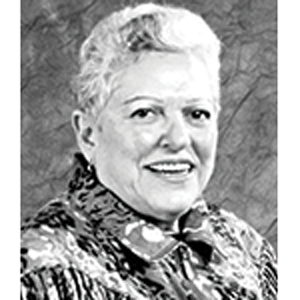 Lucie Burian Liebman was born in 1927 in Vienna, Austria to parents of Czech nationality. In 1938, after the Anschluss of Austria, Lucie woke up to Nazi flags hanging from every building along her street. Lucie, her brother Paul, and her parents fled Vienna and moved to Prague to be with her grandparents. But persecution found them again. In 1939, Nazi Germany occupied Czechoslovakia, and soon Lucie and Paul were no longer allowed to go to school. Jewish families were no longer allowed to have their own apartments, so rooms in her family’s apartment were apportioned to other families. Lucie was to experience greater difficulty as she was separated from her brother. Paul was sent to Scotland on the Kindertransport, later immigrating to England, where he joined a fire brigade. Lucie never saw her brother again, as he died from an injury received during a bombing. Lucie remained in Prague, where she joined the Maccabaeus organization, which over time engaged in acts of resistance and sabotage against the Nazis. During this time, Lucie’s family experienced tragedy as her grandfather was beaten by the Nazis so severely that he died a few days later. Lucie also witnessed the execution of her cousins. Her grandmother was also deported to Treblinka where she was killed.
Lucie Burian Liebman was born in 1927 in Vienna, Austria to parents of Czech nationality. In 1938, after the Anschluss of Austria, Lucie woke up to Nazi flags hanging from every building along her street. Lucie, her brother Paul, and her parents fled Vienna and moved to Prague to be with her grandparents. But persecution found them again. In 1939, Nazi Germany occupied Czechoslovakia, and soon Lucie and Paul were no longer allowed to go to school. Jewish families were no longer allowed to have their own apartments, so rooms in her family’s apartment were apportioned to other families. Lucie was to experience greater difficulty as she was separated from her brother. Paul was sent to Scotland on the Kindertransport, later immigrating to England, where he joined a fire brigade. Lucie never saw her brother again, as he died from an injury received during a bombing. Lucie remained in Prague, where she joined the Maccabaeus organization, which over time engaged in acts of resistance and sabotage against the Nazis. During this time, Lucie’s family experienced tragedy as her grandfather was beaten by the Nazis so severely that he died a few days later. Lucie also witnessed the execution of her cousins. Her grandmother was also deported to Treblinka where she was killed.
As the situation deteriorated, Lucie’s father began the difficult process of applying for immigration papers. Thanks to connections in the United States that sponsored the family, he was able to secure papers. Lucie and her parents took a train to Paris but due to a bombing were forced to walk to Spain. From Spain they took a train to Portugal. It was on this train that Lucie was assaulted by two Nazi soldiers in front of her parents, who were unable to stop them. After arriving in Lisbon, Lucie and her parents boarded a ship bound for the United States. They arrived in New York City on May 1, 1941. In 1950, Lucie met her soon-to-be husband on a blind date. They married two months later, settled in Brooklyn and had five children. After retirement, Lucie and her husband moved to El Paso. Lucie assisted in the starting of El Paso Holocaust Museum and served as the Museum’s first curator. Lucie died in 2017.